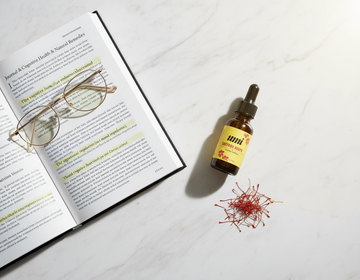Clinical Trials & Systematic Review
A growing body of clinical investigations, though still limited in scale, points to saffron’s potential in treating ADHD symptoms:
-
A 2024 systematic review (Seyedi-Sahebari et al.) encompassed 4 clinical trials and 118 total patients. It concluded that saffron—either as a stand-alone or adjunctive therapy—improved ADHD symptoms with a good safety profile. PubMed
-
Blasco-Fontecilla et al. 2022, a non-randomized effectiveness study in children/adolescents (ages 7–17), found that saffron extract (Saffr’Activ®, 30 mg/day) was comparable overall to methylphenidate, with saffron showing particular strength in improving hyperactivity, whereas methylphenidate better addressed inattention. Both improved sleep, but saffron made falling asleep easier. PMC+1
-
A 2019 randomized double-blind pilot trial (Baziar et al.) found saffron (20–30 mg/day) similarly effective to methylphenidate for ADHD treatment in children. PubMed+1
-
A trial adding saffron to methylphenidate (Khaksarian et al. 2021) showed augmented benefits over methylphenidate alone. PubMed+1
Mechanisms at Work
How might saffron help with ADHD?
-
It influences dopamine, serotonin, and noradrenaline—key neurotransmitters involved in attention and hyperactivity regulation. PMC+2Healthline+2
-
Possesses antioxidant and anti-inflammatory properties, potentially protecting neural circuits and improving executive function. PMC+1
-
Improvements in sleep may contribute further to reducing ADHD symptoms. PMC+1
What Influencers and Popular Media Say
While peer-reviewed studies are limited, several health outlets and advocates highlight saffron’s ADHD relevance:
-
Healthline (Nov 2023) summarized that saffron appears promising both as monotherapy (20–30 mg/day) and adjunctive therapy, with a good safety record. Healthline
-
Medical News Today (mid-2023) reviewed several studies, noting comparable effects to methylphenidate and additional benefits on hyperactivity and sleep. Medical News Today
-
Smaller integrative medicine blogs and ADHD-focused organizations (like CHADD) have discussed these findings, often emphasizing saffron as a natural option for families concerned about stimulant side effects. ChADD+1
Caveats & Safety Considerations
-
Scale and duration of saffron ADHD studies are modest; larger, long-term trials are needed. PubMed+1
-
Most studies have treatment periods of 6 weeks to 3 months; long-term efficacy and safety remain uncertain. PMC+1
-
Dosing has varied, typically 20–30 mg/day in pediatric studies; optimal dosage is not yet standardized. Healthline+1
-
As with all supplements, quality control varies. Saffron products differ in purity, extract standardization, and bioavailability. Philadelphia Integrative Psychiatry+1
-
Saffron is not an FDA-approved treatment for ADHD; it should not replace prescribed medications without a healthcare provider’s approval.
Conclusion: Promising but Preliminary
The current research paints a compelling, if preliminary, picture:
-
Saffron exhibits strong antioxidant, anti-inflammatory, mood-stabilizing, and neuroprotective effects across multiple health areas.
-
In ADHD, early evidence shows that saffron may be as effective as methylphenidate—particularly for hyperactivity—and may enhance sleep and executive function when used alone or in combination. PMC+1
-
These findings suggest saffron could become a complementary strategy in ADHD management, especially for families seeking more natural or gradual approaches.
Still, caution is warranted—larger, longer, and more rigorous clinical trials are essential before recommending saffron as a full alternative to stimulant medications.
If you're considering saffron as part of an ADHD treatment plan, discuss it with a qualified clinician, particularly to avoid interactions with current medications and to monitor efficacy and safety.
References
-
Seyedi-Sahebari, S., Farhang, S., et al. (2024). The effects of Crocus sativus (saffron) on ADHD: A systematic review. J Atten Disord. PubMed
-
Blasco-Fontecilla, H., Moyano-Ramírez, E., et al. (2022). Effectivity of saffron extract (Saffr’Activ) vs methylphenidate in children/adolescents with ADHD. Nutrients. PMC+1
-
Baziar, S., Aqamolaei, A., et al. (2019). Crocus sativus vs methylphenidate in children with ADHD. J Child Adolesc Psychopharmacol. PubMed+1
-
Khaksarian, M., Ahangari, N., et al. (2021). Methylphenidate combined with saffron vs methylphenidate alone. (Trial details as in the systematic review.) PubMed
-
El Midaoui, A., et al. (2022). Saffron (Crocus sativus L.): A source of nutrients for cardiovascular and metabolic health. PMC. PMC
-
Healthline (2023), Can saffron help with ADHD symptoms? Healthline
-
Medical News Today (2023), Can saffron help with ADHD? Medical News Today




